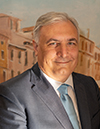Studying at the University of Verona
Here you can find information on the organisational aspects of the Programme, lecture timetables, learning activities and useful contact details for your time at the University, from enrolment to graduation.
Academic calendar
The academic calendar shows the deadlines and scheduled events that are relevant to students, teaching and technical-administrative staff of the University. Public holidays and University closures are also indicated. The academic year normally begins on 1 October each year and ends on 30 September of the following year.
Course calendar
The Academic Calendar sets out the degree programme lecture and exam timetables, as well as the relevant university closure dates..
| Period | From | To |
|---|---|---|
| primo semestre (lauree magistrali) | Oct 5, 2020 | Dec 23, 2020 |
| secondo semestre (lauree magistrali) | Mar 1, 2021 | Jun 1, 2021 |
| Session | From | To |
|---|---|---|
| sessione invernale | Jan 11, 2021 | Feb 12, 2021 |
| sessione estiva | Jun 7, 2021 | Jul 23, 2021 |
| sessione autunnale | Aug 23, 2021 | Sep 17, 2021 |
| Session | From | To |
|---|---|---|
| sessione autunnale (validità a.a. 2019/20) | Dec 9, 2020 | Dec 11, 2020 |
| sessione invernale (validità a.a. 2019/20) | Apr 7, 2021 | Apr 9, 2021 |
| sessione estiva (validità a.a. 2020/21) | Sep 6, 2021 | Sep 8, 2021 |
| Period | From | To |
|---|---|---|
| Vacanze di Natale | Dec 24, 2020 | Jan 6, 2021 |
| Vacanze di Pasqua | Apr 3, 2021 | Apr 6, 2021 |
| Vacanze estive | Aug 9, 2021 | Aug 15, 2021 |
Exam calendar
Exam dates and rounds are managed by the relevant Economics Teaching and Student Services Unit.
To view all the exam sessions available, please use the Exam dashboard on ESSE3.
If you forgot your login details or have problems logging in, please contact the relevant IT HelpDesk, or check the login details recovery web page.
Academic staff
 mariacaterina.baruffi@univr.it
mariacaterina.baruffi@univr.it
 silvano.corbella@univr.it
silvano.corbella@univr.it
 marco.giusti@univr.it
marco.giusti@univr.it
 martina.menon@univr.it
martina.menon@univr.it
 francesca.rossignoli@univr.it
francesca.rossignoli@univr.it
 0444 393941 (Ufficio Vicenza) 0458028261 (Ufficio Verona)
0444 393941 (Ufficio Vicenza) 0458028261 (Ufficio Verona)

Santi Flavio
 flavio.santi@univr.it
flavio.santi@univr.it
 045 802 8239
045 802 8239

Vannucci Virginia
 virginia.vannucci@univr.it
virginia.vannucci@univr.it
Study Plan
The Study Plan includes all modules, teaching and learning activities that each student will need to undertake during their time at the University.
Please select your Study Plan based on your enrollment year.
1° Year
| Modules | Credits | TAF | SSD |
|---|
2 modules among the following1 module between the following2° Year activated in the A.Y. 2021/2022
| Modules | Credits | TAF | SSD |
|---|
1 module between the following2 modules among the following| Modules | Credits | TAF | SSD |
|---|
2 modules among the following1 module between the following| Modules | Credits | TAF | SSD |
|---|
1 module between the following2 modules among the following| Modules | Credits | TAF | SSD |
|---|
Legend | Type of training activity (TTA)
TAF (Type of Educational Activity) All courses and activities are classified into different types of educational activities, indicated by a letter.
Nonprofit Sector Economics (2021/2022)
Teaching code
4S00421
Teacher
Coordinator
Credits
6
Language
Italian
Scientific Disciplinary Sector (SSD)
SECS-P/02 - ECONOMIC POLICY
Period
secondo semestre (lauree magistrali) dal Feb 21, 2022 al May 13, 2022.
Learning outcomes
The major goal of this course is to provide students with a better and more rigorous understanding of the key role that so called nonprofit organizations can play within contemporary economic systems (i.e. within post-industrial economies). Next, the course focuses on the specific interplays between nonprofits, for-profit firms and public organizations. These complex phenomena can be fruitfully analyzed through the lens of the major theoretical constructs and empirical findings obtained in the last years within the framework of nonprofit sector economics. The first part of the course will focus on the major theories on nonprofit organizations, whereas the second part will mainly deal with recent empirical evidence.
Program
- Why does the non profit sector exist, within a market economy? Weisbrod's theory of government failure and Hansmann's theory of market failure.
- Collective action dilemmas, trust and pro-social behavior.
- Fair trade and market economy: are they compatible? The key economic effects of fair trade on market dynamics.
- Positional goods, relational goods, (bridging vs bonding) social capital accumulation and civic capital accumulation.
- Fundraisers as mediators between donors and nonprofit organizations. Ethical issues: US position papers and the Italian experience.
References:
- Amati F., D'Acunto S., Musella M., 2021, Economia politica del terzo settore, Giappichelli editore.
- Sacco P.L., Zarri L., 2006, Perché esiste il settore non profit?, Filosofia e Questioni Pubbliche.
- Becchetti L., Paganetto L., 2003, Finanza etica. Commercio equo e solidale, Donzelli editore.
Further teaching materials will be provided online, through the E-learning service, within the specific webpage prepared for this course.
Examination Methods
Written exam (based on three open questions) aimed at testing students' familiarity with the key theoretical constructs and empirical analyses developed in the last years within the nonprofit economics framework as well as their understanding of the specific role that nonprofit organizations can play within contemporary economic systems, including the interplays between nonprofits, for-profit firms and public organizations.
Type D and Type F activities
Nei piani didattici di ciascun Corso di studio è previsto l’obbligo di conseguire un certo numero di crediti formativi mediante attività a scelta (chiamate anche "di tipologia D e F").
Oltre che in insegnamenti previsti nei piani didattici di altri corsi di studio e in certificazioni linguistiche o informatiche secondo quanto specificato nei regolamenti di ciascun corso, tali attività possono consistere anche in iniziative extracurriculari di contenuto vario, quali ad esempio la partecipazione a un seminario o a un ciclo di seminari, la frequenza di laboratori didattici, lo svolgimento di project work, stage aggiuntivo, eccetera.
Come per ogni altra attività a scelta, è necessario che anche queste non costituiscano un duplicato di conoscenze e competenze già acquisite dallo studente.
Quelle elencate in questa pagina sono le iniziative extracurriculari che sono state approvate dal Consiglio della Scuola di Economia e Management e quindi consentono a chi vi partecipa l'acquisizione dei CFU specificati, alle condizioni riportate nelle pagine di dettaglio di ciascuna iniziativa.
Si ricorda in proposito che:
- tutte queste iniziative richiedono, per l'acquisizione dei relativi CFU, il superamento di una prova di verifica delle competenze acquisite, secondo le indicazioni contenute nella sezione "Modalità d'esame" della singola attività;
- lo studente è tenuto a inserire nel proprio piano degli studi l'attività prescelta e a iscriversi all'appello appositamente creato per la verbalizzazione, la cui data viene stabilita dal docente di riferimento e pubblicata nella sezione "Modalità d'esame" della singola attività.
ATTENZIONE: Per essere ammessi a sostenere una qualsiasi attività didattica, inlcuse quelle a scelta, è necessario essere iscritti all'anno di corso in cui essa viene offerta. Si raccomanda, pertanto, ai laureandi delle sessioni di dicembre e aprile di NON svolgere attività extracurriculari del nuovo anno accademico, cui loro non risultano iscritti, essendo tali sessioni di laurea con validità riferita all'anno accademico precedente. Quindi, per attività svolte in un anno accademico cui non si è iscritti, non si potrà dar luogo a riconoscimento di CFU.
| years | Modules | TAF | Teacher |
|---|---|---|---|
| 1° 2° | Future matters | D |
Alessandro Bucciol
(Coordinator)
|
| 1° 2° | Future matters | D |
Alessandro Bucciol
(Coordinator)
|
| years | Modules | TAF | Teacher |
|---|---|---|---|
| 1° 2° | The fashion lab (1 ECTS) | D |
Maria Caterina Baruffi
(Coordinator)
|
| 1° 2° | The fashion lab (2 ECTS) | D |
Maria Caterina Baruffi
(Coordinator)
|
| 1° 2° | The fashion lab (3 ECTS) | D |
Maria Caterina Baruffi
(Coordinator)
|
| years | Modules | TAF | Teacher | |
|---|---|---|---|---|
| 1° | Wake up Italia - 2020/2021 | D |
Sergio Noto
(Coordinator)
|
|
| 1° 2° | Design and Evaluation of Economic and Social Policies | D |
Federico Perali
(Coordinator)
|
|
| 1° 2° | Public debate and scientific writing - 2020/2021 | D |
Martina Menon
(Coordinator)
|
|
Career prospects
Module/Programme news
News for students
There you will find information, resources and services useful during your time at the University (Student’s exam record, your study plan on ESSE3, Distance Learning courses, university email account, office forms, administrative procedures, etc.). You can log into MyUnivr with your GIA login details: only in this way will you be able to receive notification of all the notices from your teachers and your secretariat via email and soon also via the Univr app.
Linguistic training CLA
Graduation
List of theses and work experience proposals
| theses proposals | Research area |
|---|---|
| Analisi dell'Impatto della Regolamentazione: potenziale e applicazioni concrete | Various topics |
| Costs and benefits of the new Turin-Lyon railway line | Various topics |
| Costs and benefits of new systems for speed control on italian motorways | Various topics |
| Il futuro del corporate reporting (COVID19) | Various topics |
| I Modelli di Organizzazione, Gestione e Controllo ex d.lgs. 231/2001 | Various topics |
| Contingent valuation for the quality of hospital characteristics | Various topics |
| Evaluating occupational impacts of large investment projects | Various topics |
| Valutazioni d'azienda | Various topics |
























